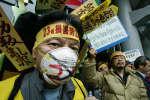December 13, 2002

ReutersáPhoto
(Clearwisdom.net) HONG KONG - Anxiety over a planned but controversial anti-subversion law has raised public concern over individual and political freedoms in Hong Kong to record levels since the former British colony returned to Chinese rule, a survey revealed on Friday.
"What we've found was a rise in anxiety and concern about personal freedoms, freedom of the press, freedom of speech, freedom of assembly, religious freedom (and) academic freedom," Michael DeGolyer, head of the Hong Kong Transition Project, told Reuters.
The government unveiled proposals for the anti-subversion law in September.
In a November survey conducted by DeGolyer's group, 10 percent of respondents said they were "very worried" about personal freedoms, a record figure since the handover and double the five percent recorded in the last poll in August.
The group polled 814 people in November and 721 in August.
The percentage of respondents who said they were "not worried" fell to 58 percent in November -- the lowest level since Hong Kong returned to Chinese rule -- from 68 percent in August.
The survey found that those expressing their anxiety included foreigners living in Hong Kong and business people.
"(Business people) showed some of the largest increases in concern about these various types of freedoms," DeGolyer said.
About 22 percent of managers and administrators polled in November said they were "somewhat" or "very worried" about personal freedom, a leap from seven percent in the last survey in August.
FEARED LAW
Beijing is keen to see the law passed to prevent Hong Kong, which enjoys much greater individual and political freedoms than on the mainland, from being used by hostile forces to subvert the Chinese government.
Under the proposed law, people found guilty of acts of treason, sedition, secession from, or subversion against the mainland government could be imprisoned for life.
Rights activists and legal experts worry the law may roll back civil liberties and could be exploited by Hong Kong and Beijing authorities to target anyone they do not like.
A pact between Britain and China promised the former British colony a high degree of autonomy for 50 years under a "one country, two systems" formula.
The territory's constitution requires it to enact a subversion law but does not specify the details or time frame.
In the survey, 54 percent of respondents thought it was not the right time to pass the controversial law.
"At a time when the economy is barely recovering, to raise issues which may have an economic effect... that doesn't seem like good timing," DeGolyer said.
A three-month round of consultation on the broad outlines of the planned law is now under way and will end in late December.
http://sg.news.yahoo.com/reuters/asia-137540.html
Category: Falun Dafa in the Media





